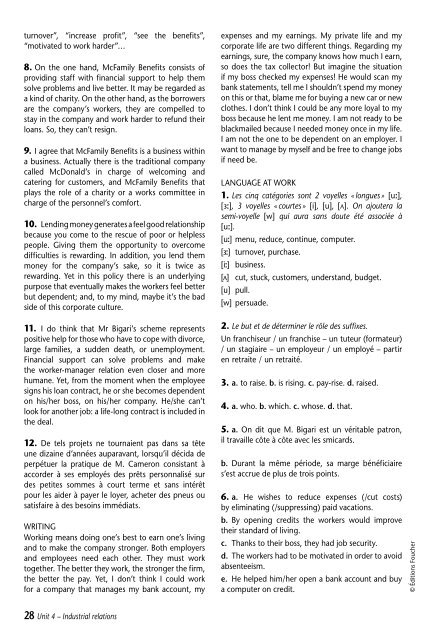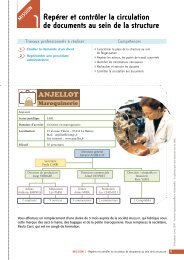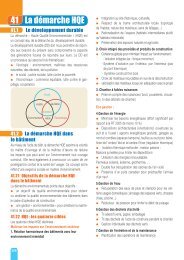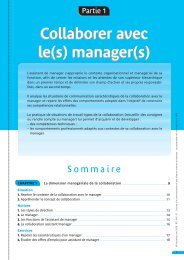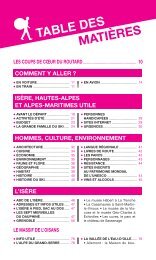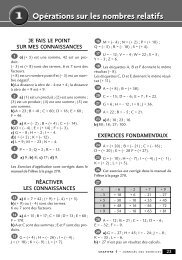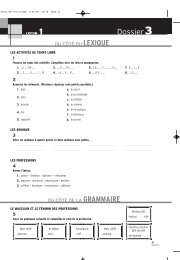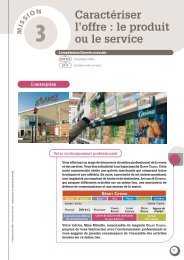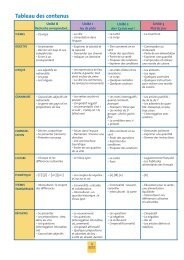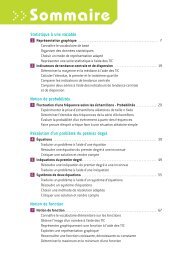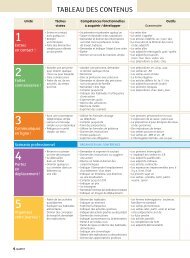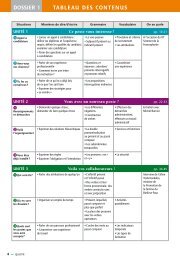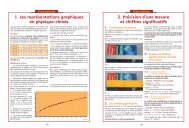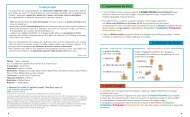GUIDE PÉDAGOGIQUE - Hachette
GUIDE PÉDAGOGIQUE - Hachette
GUIDE PÉDAGOGIQUE - Hachette
You also want an ePaper? Increase the reach of your titles
YUMPU automatically turns print PDFs into web optimized ePapers that Google loves.
turnover”, “increase profit”, “see the benefits”,<br />
“motivated to work harder”…<br />
8. On the one hand, McFamily Benefits consists of<br />
providing staff with financial support to help them<br />
solve problems and live better. It may be regarded as<br />
a kind of charity. On the other hand, as the borrowers<br />
are the company’s workers, they are compelled to<br />
stay in the company and work harder to refund their<br />
loans. So, they can’t resign.<br />
9. I agree that McFamily Benefits is a business within<br />
a business. Actually there is the traditional company<br />
called McDonald’s in charge of welcoming and<br />
catering for customers, and McFamily Benefits that<br />
plays the role of a charity or a works committee in<br />
charge of the personnel’s comfort.<br />
10. Lending money generates a feel good relationship<br />
because you come to the rescue of poor or helpless<br />
people. Giving them the opportunity to overcome<br />
difficulties is rewarding. In addition, you lend them<br />
money for the company’s sake, so it is twice as<br />
rewarding. Yet in this policy there is an underlying<br />
purpose that eventually makes the workers feel better<br />
but dependent; and, to my mind, maybe it’s the bad<br />
side of this corporate culture.<br />
11. I do think that Mr Bigari’s scheme represents<br />
positive help for those who have to cope with divorce,<br />
large families, a sudden death, or unemployment.<br />
Financial support can solve problems and make<br />
the worker-manager relation even closer and more<br />
humane. Yet, from the moment when the employee<br />
signs his loan contract, he or she becomes dependent<br />
on his/her boss, on his/her company. He/she can’t<br />
look for another job: a life-long contract is included in<br />
the deal.<br />
12. De tels projets ne tournaient pas dans sa tête<br />
une dizaine d’années auparavant, lorsqu’il décida de<br />
perpétuer la pratique de M. Cameron consistant à<br />
accorder à ses employés des prêts personnalisé sur<br />
des petites sommes à court terme et sans intérêt<br />
pour les aider à payer le loyer, acheter des pneus ou<br />
satisfaire à des besoins immédiats.<br />
WRITING<br />
Working means doing one’s best to earn one’s living<br />
and to make the company stronger. Both employers<br />
and employees need each other. They must work<br />
together. The better they work, the stronger the firm,<br />
the better the pay. Yet, I don’t think I could work<br />
for a company that manages my bank account, my<br />
28 Unit 4 – Industrial relations<br />
expenses and my earnings. My private life and my<br />
corporate life are two different things. Regarding my<br />
earnings, sure, the company knows how much I earn,<br />
so does the tax collector! But imagine the situation<br />
if my boss checked my expenses! He would scan my<br />
bank statements, tell me I shouldn’t spend my money<br />
on this or that, blame me for buying a new car or new<br />
clothes. I don’t think I could be any more loyal to my<br />
boss because he lent me money. I am not ready to be<br />
blackmailed because I needed money once in my life.<br />
I am not the one to be dependent on an employer. I<br />
want to manage by myself and be free to change jobs<br />
if need be.<br />
LANGUAGE AT WORK<br />
1. Les cinq catégories sont 2 voyelles « longues » [u:],<br />
[:], 3 voyelles « courtes » [i], [u], []. On ajoutera la<br />
semi-voyelle [w] qui aura sans doute été associée à<br />
[u:].<br />
[u:] menu, reduce, continue, computer.<br />
[:] turnover, purchase.<br />
[i:] business.<br />
[] cut, stuck, customers, understand, budget.<br />
[u] pull.<br />
[w] persuade.<br />
2. Le but et de déterminer le rôle des suffixes.<br />
Un franchiseur / un franchise – un tuteur (formateur)<br />
/ un stagiaire – un employeur / un employé – partir<br />
en retraite / un retraité.<br />
3. a. to raise. b. is rising. c. pay-rise. d. raised.<br />
4. a. who. b. which. c. whose. d. that.<br />
5. a. On dit que M. Bigari est un véritable patron,<br />
il travaille côte à côte avec les smicards.<br />
b. Durant la même période, sa marge bénéficiaire<br />
s’est accrue de plus de trois points.<br />
6. a. He wishes to reduce expenses (/cut costs)<br />
by eliminating (/suppressing) paid vacations.<br />
b. By opening credits the workers would improve<br />
their standard of living.<br />
c. Thanks to their boss, they had job security.<br />
d. The workers had to be motivated in order to avoid<br />
absenteeism.<br />
e. He helped him/her open a bank account and buy<br />
a computer on credit.<br />
© Éditions Foucher


